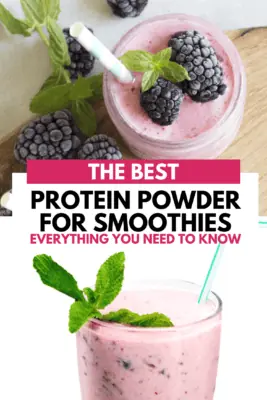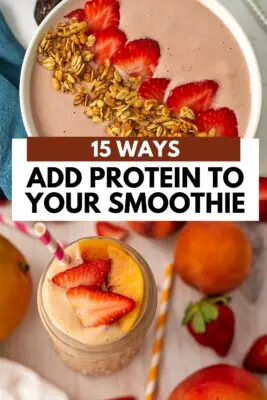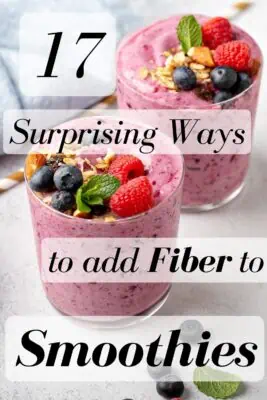Best Protein Powder for Smoothies
Finding the best protein powder for smoothies can help make your smoothies creamy, delicious and super filling. Using protein powder is a simple and easy way to add protein to smoothies. Protein powder is often sweetened, so it can add an additional layer of sweetness to the smoothie, which is especially helpful if you are also adding vegetables or using less sweet fruit.
Adding protein to your smoothies is an easy way to balance out the macronutrients (usually smoothies are heavier in carbs) and make them more satisfying. Having a smoothie with just fruit or just fruits and vegetables will likely leave you feeling hungry very quickly afterwards. Adding protein (and healthy fats) can help make smoothies much more filling and satisfying.

What to consider when choosing a protein powder for smoothies
When trying to decide what kind of protein powder to use, there are a few things you may want to consider when choosing a protein powder for your smoothies:
The source of the protein
Protein powders are usually in two categories, vegan (or plant based) and animal based. Further, the source of the protein is often something that needs to be considered.
- For vegan protein powder the source of the protein can be from one individual plant or a mix of plants. Most vegan protein powders are made from one or more of these ingredients: peas, pumpkin seeds, brown rice, chia, peanut, quinoa.
- For animal-based protein, there are a few different categories. Whey protein is a very popular option and is made from whey (a dairy bi-product), and can sometimes cause digestion issues. Collagen peptides are made from the hides and connective tissues of cows (or fish) and are hydrolyzed into a powder. Beef protein powder is made from beef protein, so it does not have the same digestive issues as whey. Egg white protein powder is made by drying egg whites and grinding them into a powder.

The sweetener added
Most protein powders are sweetened to make them more palatable (so you will enjoy drinking them in smoothies or as protein shakes). Most brands are using some sort of no calorie or low calorie sweetener. Using a sweetened protein powder can certainly help make your smoothies more delicious, however you don’t want the protein powder to taste like fake sugar, or that is all you will taste. Most protein powders are sweetened with one or more of these ingredients:
- Stevia (sometimes seen on ingredient lists as as Reb-A) – stevia is the most common sweetener added to protein powders on the market right now. It’s super sweet (100-300 times sweeter than table sugar) and is considered to be a clean ingredient since it’s derived from plants. Stevia can leave a bitter aftertaste that is often hard to cover up and many people are negatively impacted by stevia (it can cause digestive issues).
- Monk fruit (Lou han guo) – monk fruit is a very common no calorie sweetener added to protein powder. It is 150-200 times sweeter than sugar. Monk fruit leaves less of a “fake sugar” taste than stevia and is a great alternative to those who cannot tolerate stevia or do not care for the taste of stevia. Monk fruit is more difficult to harvest, so it’s more expensive, so you see it in less protein powders than you see stevia.
- Aspartame or Sucralose – avoid protein powders with these ingredient at all cost. They have both been linked to cancer. If the brand you are using is adding this, it likely does not have quality ingredients or care about the health of its customers.
- Coconut sugar – coconut sugar is not a low calorie or low carb addition to protein powder but is a natural form of sugar. This is the easiest to digest but isn’t found in most protein powders because people using protein powder are looking for “low carbs, high protein”.
- Thaumatin – thaumatin is a low calorie sweetener from the katemfe fruit (Thaumatococcus danielli plant). Thaumatin is a protein, not a carb and is about 2000-3000 times sweeter than table sugar (so only a very small amount is needed to sweeten the protein powder). Because it’s a protein, not a carb, the body digests it differently so this can be helpful if you are really trying to watch your carb intake.
Additional ingredients
The rule of thumb when looking for a protein powder is usually the less ingredients, the better. However, some protein powders blend together more than one protein source (this is very normal in vegan protein powders to help you get in all the essential amino acids) and some protein powders add other ingredients like greens or probiotics.
This will be a personal preference, but it’s important to look at the quality of those added ingredients when considering the best protein powder for smoothies.

Cost
This is often the biggest barrier to buying protein powder. You don’t want to spend a ton of money on a tub of protein powder that you aren’t going to enjoy. And if you do enjoy it, it needs to fit into your monthly budget.
Most protein powders are between $1.50 and $4 per serving. Even with the most expensive protein powder option, making your smoothies at home still tends to be less expensive than buying smoothies at smoothie shops or coffee houses.
Protein powder to add to smoothies
Pea protein – pea protein is one of the most common vegan protein powders, so there are a variety of options. Here are two of my favorites:
- Nuzest Pea Protein. It has simple, clean ingredients and is very easy to digest. Nuzest is sweetened with thaumatin (a protein not a carb) and is about $1.90 per serving and has 20 grams of protein per serving.
- Promix – this is my new go-to pea protein powder, with 25 grams of protein per serving. It has actual vanilla bean (instead of vanilla flavor), added B12 (in the form of methylcobalamin) and is lightly sweetened with monk fruit. It cost $1.14 per serving.
Almond protein – almond protein powder is both vegan (plant based) and paleo friendly.
- My go to is Octonuts Vanilla Protein Powder. It’s made with almonds and sweetened with coconut sugar (no stevia) and the flavor is great! Octonuts is about $1.47 per serving and has 14 grams of protein per serving.
Pumpkin Seed Protein – pumpkin seed protein is allergy friendly and is vegan and paleo friendly. If you are using an unsweetened pumpkin seed protein, you will likely want to add some extra sweetness by adding some honey, maple syrup, pitted dates or adding a banana to the smoothie.
- Food to Live Organic Pumpkin Seed Protein Powder – this unsweetened protein powder has just one ingredient, pumpkin seeds. It’s $1 per serving with 18 grams of protein per serving.
- Mary Ruth’s Chocolate Pumpkin Protein is sweetened with cane sugar and has a very limited ingredient list. It’s $1.85 a serving and has 14 grams protein per serving.
Blend of protein sources – If you want a blend of protein sources (pea protein, pumpkin protein), I highly recommend Truvani Plant Based Protein and Four Sigmatic Plant Based Protein.
- Truvani Plant Based protein has very simple, clean ingredients, is sweetened with monk fruit and is about $2.50 per serving.
- Four Sigmatic Peanut Protein – this protein is a blend of pea protein, hemp protein, chia, coconut and pumpkin seed protein. It is sweetened with coconut palm sugar and monk fruit. This protein powder also has an array of mushrooms and things like ashwagandha to help with muscle repair. This cost about $2.53 per serving.

Peanut powder (peanut butter protein) – peanut powder is the powder leftover after extracting the oil from roasted peanuts. After pressing out the oil, the dried peanuts are ground down into a fine powder which is ready to use in smoothies (or you can just add water to make a thick paste that tastes just like peanut butter without the fat). Peanut powder is usually unsweetened, but some brands have added sugar. I like to use an organic peanut butter protein powder.
Norcal Organics Peanut Butter Protein is great, it’s unsweetened and is $0.75 per serving for 11 grams of protein per serving.
Whey protein – if you can tolerate whey protein, that is also a great way to add protein to the smoothie. Whey protein is vegetarian friendly but not vegan friendly. It will not have the same consistency, so the smoothie may be slightly thinner (since whey doesn’t absorb the liquid like the vegan protein does). Use a sweetened or unsweetened whey protein that is grass fed.
Beef protein – If you are not vegan/vegetarian, beef protein is a great option. Unlike whey protein, the beef protein powder is not made from the whey (dairy) so it’s easier to digest than whey protein.
- Equip Foods Brand Peanut Butter or Chocolate are both great options for most smoothies. Equip Foods Prime Proteins are sweetened with stevia and is about $2.05 per serving, for 20 grams of protein per serving.
Collagen peptides – collagen peptides are usually unflavored and easily dissolve into most hot and cold beverages. They are easy to digest and a great way to add protein to any smoothie. You could add these in addition to any of the other protein powders listed, as they do not change the flavor or the texture of the smoothie at all. Since these are unsweetened, if you are only using collagen peptides, you may want to add some honey/maple syrup/dates/banana to add some extra sweetness.
- The collagen peptides from Thrive Market are $0.51 per serving and offer 10 grams of protein per serving.

What to consider when using protein powder in smoothies
Vegan protein powders absorb liquid so they usually need more liquid than whey based protein, beef protein or collagen peptides. If a recipe is written specifically for vegan protein powder, you can add about ¼ cup of rolled oats to create the same texture/consistency.
The flavor of the protein powder will change the flavor of the smoothie – adding a vanilla or chocolate protein powder will change the flavor of the smoothie. To be safe, I usually recommend vanilla protein powder unless the smoothie has other chocolate ingredients or the fruits naturally go well with chocolate (like bananas, strawberries, raspberries or dark sweet cherries).
What are other ways to add protein to smoothies
There are so many ways to add protein to smoothies, check out this article for 13 ways to add protein to smoothies. You can combine different sources of protein to make the smoothie super filling. Some of my favorite ways to add protein to smoothies in addition to using protein powder are:
- Hemp hearts
- Rolled oats
- Peanut butter or chocolate tahini spread
- Black beans or white beans (like cannellini beans, navy beans or great northern white beans)
- Recipes that use protein powder





